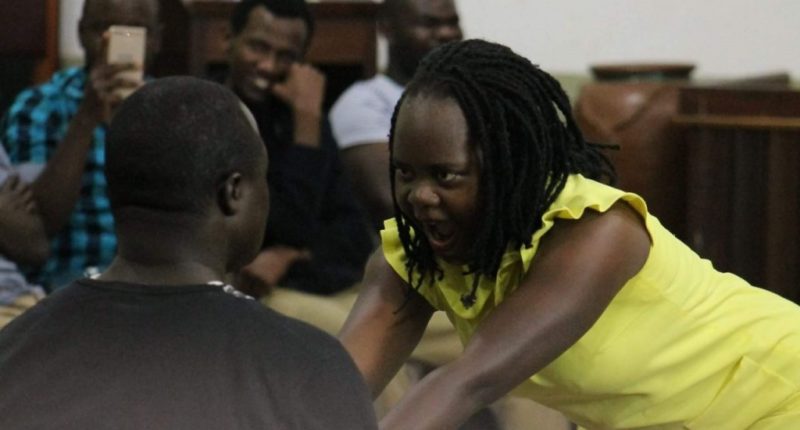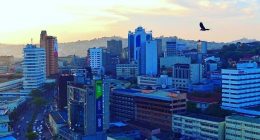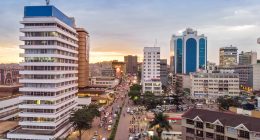It was in 2016 when I first attended the Writivism festival, an annual literary festival organized in Kampala.
One of the most memorable events at the festival was a performance I Bow for my Boobs. The provocative title had clearly drawn many curious faces some of whom were standing, overflowing outside the musty museum room. There is an energy that was stirred when the night’s performer walked into the room.
Wearing a short yellow dress, Harriet Anena, in her first poetry performance at Writivism, hypnotizes, preaches, entertains and leaves the stage with a standing ovation. I am transfixed by the provocative performance which I later learn is political erotica. If you watched this performance, this is a face, a name that can only be forgotten with very deliberate effort.
I meet Anena on a quiet Sunday afternoon at a coffee shop that has become an adjunct work and meeting space for Kampala’s expats and millennials. We have tried to meet earlier in the week at the African Centre for Media Excellence (ACME) offices in Bbunga where she creates online content and trains journalists. I have been looking forward to this meeting all week and there’s that kind of excitement you have in your stomach before you receive your order when you are famished. Before I settle in, I find Anena’s guest, a Romanian, standing up to leave after doing exactly what I intend to do; get to know Anena. It seems that it has become such a thing of urgency.
In December 2018, Anena broke the literary and Ugandan internet when she won the Wole Soyinka Prize for her self-published book, A Nation in Labour. When I ask how that felt, it is clear that it is a question she has had to answer multiple times but one whose answer is different each time. “It feels surreal,” she says with a hearty laughter when I comment that she has “made it,” in accordance with many writers’ definition of success.
Starting Out
Anena’s writing, like for most, started as catharsis. With everything that was happening in her home town of Gulu in northern Uganda, it was a way to imagine an alternative ideal world where everything is perfect. She, like Beatrice Lamwaka who has also received a Caine Prize nod, writes about the experiences of the war in northern Uganda. Writing, even when she moved to Kampala for university in 2006, has been a way for her to find answers to some of life’s pertinent questions as well as processing her experiences. When Anena talks about how the lives of women in northern Uganda have changed following the end of the LRA war, how they are not waiting for men to carry on with their lives, I ask if she thinks of it as a feminist revolution. She’s apprehensive that it’s not really because of choice, only that life has had to carry on.
The way her work is focused on the lives of women brings us back to her one-woman show, I Bow for My Boobs. The performance, being her first, left me wondering if she was accustomed to being excellent at whatever she tries her hand on.
In her performances, and her work in general, Anena uses women to broaden our understanding of politics which she says is usually restricted to the man in parliament. “My definition extends to the relationship between a man and a woman,” she says introspectively, which follows in the way thinkers like Audre Lorde have emphasized that the personal is political. Anena’s performance explored domestic violence, with the woman imagining a better life for herself by weaponizing her boobs. It was a way of exploring how desperation can push you into thinking of unconventional ways of solving problems. Despite the rousing the performance, Anena is not planning to do another show. “I am now only a page poet,” she describes herself. She has also gravitated to short story fiction but declines to define herself as just one or the other. She is simply a writer.
The recognition Anena is receiving now has come 14 years after she wrote her first poem. “When you work at something and keep at it, everything will follow,” she says with the conviction of someone who is sure of themselves. “You need the confidence to say, my work is good. A lot of people can tell you it is good but reaching that point as a writer yourself is important.” She has gotten a lot of opportunities from recognition and with the very same confidence assures me she’s taking advantage of all of them. When she studied journalism at the university, she wasn’t sure she could be a full-time writer but she is now aware of the possibilities and working towards it.
I am curious as to how there can be more Anenas in Uganda. She describes the Ugandan literary scene as robust giving examples of the Writivism mentorship program, the editorial workshop with African Writer’s Trust and Sooo Many Stories publishing house. “There are so many platforms with opportunities writers can take advantage of. Writers should put their work out there in as many places. The rejections never stop coming. They still do, but you keep at it.”
Anena’s Influences
When I ask about who has mentored and influenced her work, she mentions NoViolet Bulawayo, Warsan Shire, Jennifer Makumbi and Lydia Kasese before catching herself to say she should not mention names because she can’t name everyone. “We are writers, we have egos so you can’t say things fwaa,” she says. We laugh and instead have a moment acknowledging the admiration we both share for Lydia Kasese’s work, someone who is Anena’s contemporary. She thinks it is easier to connect in digital age, so no one is really that far out of your reach if you need them. More than once, Anena emphasizes the importance of attending literary festivals to gain community as a writer. “I met Tinashe, a Zimbabwean writer, at last year’s Writivism festival and he has been extremely supportive to my writing.” She mentions Nigerian poet Dami Ajayi as well and as a producer, a warm feeling touches my cheeks. I ask if she easily connects with people and she says no, she’s not very outgoing and is afraid of crowds but she makes the effort.
The sun is now disappearing and the coffee shop is emptying. There is the dull atmosphere that hangs over Sunday evenings but apart from the Afro comb earrings, there is a tattoo on her left arm that reads, “I am a poem” that catches my attention. I am hesitant to ask about it, wondering if it is invasive but she laughs it off and explains that poetry is her life. “There is no other phrase more appropriate,” she says. It reminds me of Audre Lorde’ in Poetry is Not a Luxury; “For women, then, poetry is not a luxury. It is a vital necessity of our existence.”









